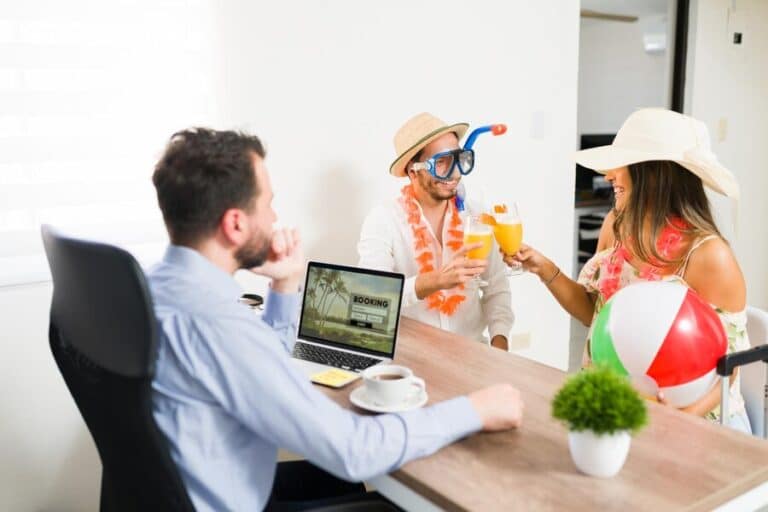In recent years, the concept of bleisure travel—a blend of business and leisure—has gained significant traction among professionals who seek to make the most of their work-related trips. This trend allows travelers to extend their business trips to include leisure activities, transforming what could be a stressful work trip into a more enjoyable and enriching experience. As remote work and flexible schedules become more common, bleisure travel is not just a fleeting trend; it’s quickly becoming a staple in the travel industry.
What is Bleisure Travel?

Bleisure travel refers to the practice of adding leisure time to a business trip. For instance, if an employee travels to attend a conference or meeting, they might choose to stay an extra few days to explore the destination, relax, or engage in local activities. This approach not only maximizes the value of travel expenses but also enhances the overall experience for the traveler.
The Benefits of Bleisure Travel
1. Improved Work-Life Balance
One of the primary advantages of bleisure travel is its ability to enhance work-life balance. Instead of rushing back home immediately after meetings, travelers can take time to unwind and explore new places. This opportunity for relaxation can significantly reduce stress and prevent burnout.
2. Increased Employee Satisfaction and Productivity
Companies that support bleisure travel often see happier employees. Research indicates that allowing team members to incorporate leisure into their business trips leads to higher job satisfaction and motivation. Employees return from these trips feeling rejuvenated, which can translate into increased productivity upon their return to work.
3. Opportunities for Personal and Professional Growth
Bleisure travel provides unique opportunities for personal development. Travelers can immerse themselves in new cultures, learn new skills, and build professional networks while enjoying leisure activities. This exposure broadens horizons and fosters creativity, which can benefit both personal and professional growth.
4. Cost-Effective Travel
By extending business trips for leisure purposes, travelers can save on costs associated with flights and accommodations. Since a portion of these expenses is covered by their employer, they can enjoy additional leisure activities without significantly impacting their budget.
5. Strengthening Professional Relationships
Combining business with leisure can also enhance relationships with colleagues or clients. Sharing leisure experiences—such as dining out or exploring local attractions—can help forge stronger bonds and improve collaboration in the workplace.
How to Make the Most of Bleisure Travel
- Plan Ahead: When booking your business trip, consider potential leisure activities you’d like to pursue afterward. Research local attractions, restaurants, and events that interest you.
- Communicate with Your Employer: Ensure that your employer supports your plans for bleisure travel. Clear communication about your intentions can help avoid any misunderstandings regarding time off or expenses.
- Pack Wisely: Bring appropriate clothing and gear for both business meetings and leisure activities. A versatile wardrobe will help you transition smoothly between work and play.
- Stay Flexible: While it’s essential to have a plan, be open to spontaneous opportunities that may arise during your travels. Sometimes the best experiences come from unplanned adventures.
Conclusion
The rise of bleisure travel reflects a growing recognition of the importance of work-life balance in today’s fast-paced world. By combining business trips with leisure activities, travelers can enhance their experiences while benefiting both personally and professionally. As this trend continues to grow, it offers exciting opportunities for companies and employees alike to foster satisfaction, productivity, and cultural engagement in an increasingly interconnected world.
Frequently Asked Questions
1. What exactly is bleisure travel?
Bleisure travel combines business trips with leisure activities by extending the trip for personal enjoyment after work commitments are fulfilled.
2. Why has bleisure travel become popular?
The rise of remote work and flexible schedules has made it easier for professionals to blend work with leisure, enhancing their overall travel experience.
3. How can I plan a successful bleisure trip?
Plan ahead by researching potential leisure activities at your destination while communicating your intentions with your employer regarding time off.
4. What are the benefits of bleisure travel?
Benefits include improved work-life balance, increased employee satisfaction, cost savings on travel expenses, opportunities for personal growth, and strengthened professional relationships.
5. Can I bring family or friends on a bleisure trip?
Yes! Many travelers choose to invite family or friends along for the leisure portion of their trip, making it a shared experience.
6. How do employers view bleisure travel?
Many employers recognize the benefits of bleisure travel as it leads to happier employees who return more productive after taking time to relax.
7. Are there specific destinations known for being ideal for bleisure travel?
Destinations with rich cultural offerings and attractions—such as Paris, Tokyo, New York City, or Barcelona—are popular choices for combining business with leisure.
8. How do I balance work obligations with leisure activities during my trip?
Create a schedule that allocates specific times for work commitments while leaving ample time for exploration and relaxation.
9. What should I pack for a bleisure trip?
Pack versatile clothing suitable for both business meetings and casual outings; don’t forget any necessary equipment or materials needed for work tasks.
10. Is there an additional cost associated with extending my stay?
While some costs (like flights) may be covered by your employer during the business portion, you’ll need to budget for accommodations and activities during your extended stay.

